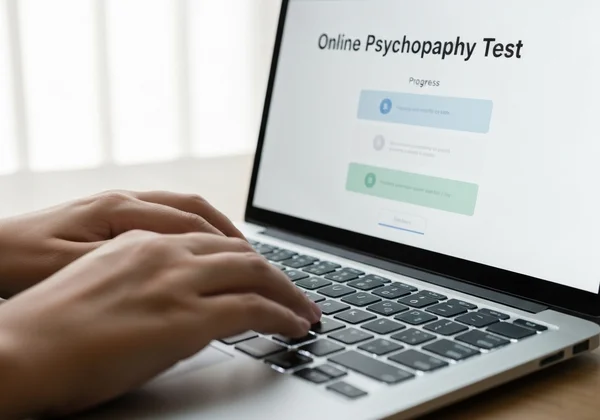مقارنة اختبارات السيكوباتية: PCL-R، ليفنسون، واختبار الذكاء الاصطناعي الخاص بنا
يمكن أن يكون التنقل في عالم التقييمات النفسية معقدًا، خاصة عند استكشاف موضوع دقيق مثل السيكوباتية. من الأدوات السريرية الدقيقة إلى أدوات الفحص عبر الإنترنت سهلة الوصول، توجد مجموعة متنوعة من الأدوات، لكل منها غرض ومنهجية فريدة. بالنسبة لأي شخص لديه فضول بشأن مفهوم السيكوباتية - سواء كان طالبًا أو محترفًا أو شخصًا في رحلة لاكتشاف الذات - فإن فهم هذه الاختلافات هو المفتاح. إذن، هل يمكنك اختبار السيكوباتية بدقة وماذا تكشف عنه الاختبارات المختلفة؟ يقارن هذا الدليل الأدوات السريرية المرجعية مع الحلول الحديثة عبر الإنترنت لتقديم توضيح.
الهدف الأساسي لأي اختبار سيكوباتية هو قياس مجموعة محددة من السمات الشخصية والعاطفية والسلوكية. ومع ذلك، فإن الطريقة التي يحققون بها ذلك تختلف اختلافًا كبيرًا. سيقوم هذا المقال بتقسيم ثلاثة مناهج متميزة: مقياس Hare PCL-R الذي يقيمه الخبراء السريريون، ومقياس Levenson Self-Report Scale المستخدم على نطاق واسع، والنهج المبتكر المدعوم بالذكاء الاصطناعي المتاح هنا. لبدء رحلتك في الفهم، يمكنك استكشاف سماتك من خلال اختبارنا المستوحى علميًا.
المعيار السريري: قائمة هير للسيكوباتية المنقحة (PCL-R)
عندما يناقش المتخصصون في علم النفس الجنائي والسريري تقييم السيكوباتية، تبدأ المحادثة دائمًا تقريبًا بقائمة هير للسيكوباتية المنقحة (PCL-R). تم تطويره بواسطة الدكتور روبرت هير، ويعتبر على نطاق واسع المعيار المرجعي لتقييم السمات السيكوباتية في البيئات السريرية والإصلاحية. إنه المعيار الذي تقاس به العديد من الأدوات الأخرى.
ما هو PCL-R وكيف يتم إجراؤه؟
PCL-R ليس استبيانًا بسيطًا يمكنك ملؤه بنفسك. إنها أداة تقييم سريري متطورة يجب أن يقوم بها أخصائي صحة نفسية أو أخصائي إصلاحي مدرب تدريبًا عالياً. العملية مكثفة، وتتضمن مقابلة شبه منظمة مع الفرد ومراجعة شاملة لمعلوماته الإضافية، مثل السجلات الجنائية، وتاريخ التوظيف، ومقابلات الأسرة. يقوم الأخصائي بتقييم 20 عنصرًا تتعلق بسمات مثل الطلاقة اللفظية السطحية، والشعور المبالغ فيه بقيمة الذات، ونقص التعاطف، والاندفاع.

نقاط القوة والقيود لهذا التقييم الخبير
تتمثل القوة الأعظم لـ PCL-R في درجة موثوقيته وصلاحيته التنبؤية العالية، خاصة في التنبؤ بالسلوك العنيف أو المعادي للمجتمع في المستقبل. نهجها الشامل والمتعدد الأوجه يقلل من خطر قيام شخص ما بتزييف إجاباته. ومع ذلك، فإن قيدها الرئيسي هو عدم إمكانية الوصول إليها. يتطلب وقتًا كبيرًا ونفقات وخبيرًا معتمدًا لإجرائه، مما يجعله غير مناسب للاستخدام العام أو للأفراد الذين يبحثون عن رؤى أولية حول ذواتهم. PCL-R هو مساعد تشخيصي قوي، وليس أداة للاستكشاف الذاتي.
وجهات نظر التقرير الذاتي: مقياس ليفنسون للسيكوباتية للتقرير الذاتي (LSRP)
بالابتعاد عن الأدوات التي يقيمها الخبراء، نجد مقاييس التقرير الذاتي مثل مقياس ليفنسون للسيكوباتية للتقرير الذاتي (LSRP). تم تصميم هذا النوع من الاختبارات للأفراد لإكماله بأنفسهم، مما يوفر منظورًا مختلفًا ولكنه ذي قيمة متساوية للسمات السيكوباتية. إنه أحد أكثر المقاييس شيوعًا المستخدمة في الأبحاث غير الجنائية، مثل الدراسات مع طلاب الجامعات.
التعمق في LSRP: الهيكل والأبعاد السيكومترية
LSRP هو استبيان يقوم فيه المستجيبون بتقييم مدى موافقتهم أو عدم موافقتهم على سلسلة من العبارات. تم تصميم هذه العبارات لاستكشاف الأبعاد السيكومترية الأساسية للسيكوباتية. ينقسم المقياس عادةً إلى عاملين رئيسيين: السيكوباتية الأولية، التي تغطي السمات العاطفية والشخصية مثل الأنانية، ونقص التعاطف، والتلاعب؛ والسيكوباتية الثانوية، التي تتعلق بسمات نمط الحياة مثل الاندفاع والميل إلى الملل.

مزايا وعيوب مقاييس التقرير الذاتي في السيكوباتية
الميزة الأساسية لمقاييس التقرير الذاتي مثل LSRP هي سهولة الوصول إليها وسهولة استخدامها. يتم إجراؤها بسرعة وتوفر نافذة مباشرة لإدراك الفرد لذاته. ومع ذلك، فهي أيضًا تتأثر ببعض التحيزات. قد يفتقر المستجيب إلى الوعي الذاتي أو قد يكذب عمدًا لتقديم نفسه في ضوء أكثر إيجابية - أو أقل إيجابية، اعتمادًا على أهدافه. على الرغم من هذه القيود، فهي أدوات لا تقدر بثمن للبحث وللأفراد الذين يبدأون في استكشاف أنماط شخصيتهم الخاصة. إذا كنت مهتمًا بتقييم ذاتي حديث، ففكر في إجراء اختبار طيف السيكوباتية.
اختبارات السيكوباتية عبر الإنترنت: سهولة الوصول والرؤى الأولية
لقد جلب العصر الرقمي فئة ثالثة: اختبار السيكوباتية عبر الإنترنت. تم تصميم هذه الاختبارات، المستوحاة غالبًا من المفاهيم السريرية مثل PCL-R ومقاييس التقرير الذاتي مثل LSRP، لمنح عامة الناس طريقة سرية ومتاحة لاستكشاف السمات السيكوباتية. إنها تلعب دورًا تعليميًا وإعلاميًا حاسمًا، وتُجسّر الفجوة بين البحث الأكاديمي والفضول الشخصي.
دور أدوات الفحص الرقمية في اكتشاف الذات
يجب فهم أدوات الفحص الرقمية على أنها أدوات لاكتشاف الذات والتعليم. لم يتم تصميمها لتقديم تشخيص سريري، بل لتقديم لمحة أولية عن السمات التي قد تتماشى مع طيف السيكوباتية. بالنسبة للعديد من المستخدمين، تعمل هذه الاختبارات كنقطة انطلاق قيمة، مما يحفز على التفكير الذاتي الأعمق أو يشجعهم على طلب التوجيه المهني. تم تصميم اختبار السيكوباتية المجاني لهذا الغرض بالضبط - لتوفير مساحة آمنة للاستكشاف الشخصي.

الفروق الرئيسية: أدوات الفحص عبر الإنترنت مقابل التشخيصات السريرية الرسمية
من الأهمية بمكان التمييز بين أداة الفحص عبر الإنترنت والتشخيصات السريرية الرسمية. لا يمكن إجراء تشخيص لاضطراب الشخصية إلا بواسطة أخصائي صحة نفسية مؤهل بعد تقييم شامل. لا يمكن ولا ينبغي للاختبارات عبر الإنترنت أن تحل محل هذه العملية. على منصتنا، نحن شفافون بشأن هذا التمييز. اختبارنا هو أداة غير تشخيصية تهدف إلى تقديم رؤى تعليمية، وليس حكمًا على الصحة العقلية. فكر فيه كمرآة للتأمل، وليس كمطرقة قاضٍ.
اختبارنا المدعوم بالذكاء الاصطناعي: حدود جديدة للفهم المخصص
هذا يقودنا إلى النهج الفريد الذي يقدمه اختبارنا المدعوم بالذكاء الاصطناعي. لقد استفدنا من إطار عمل مستوحى علميًا، يجمع بين سهولة الوصول إلى الاختبارات عبر الإنترنت وطبقة جديدة من العمق التحليلي المدعوم بالذكاء الاصطناعي. هدفنا هو تجاوز مجرد درجة بسيطة وتقديم فهم مخصص حقيقي لملف شخصيتك الفريد.
كيف يقدم اختبار الذكاء الاصطناعي الخاص بنا رؤى أعمق ومخصصة
بعد إكمال الاستبيان الأولي الخاص بنا، تتلقى درجة ملخصة. ومع ذلك، تكمن القيمة الحقيقية في تقريرنا المدعوم بالذكاء الاصطناعي. لا يخبرك هذا التقرير فقط بمكان وقوعك على الطيف؛ بل يساعدك على فهم السبب. يقوم الذكاء الاصطناعي بتحليل أنماط استجابتك لإنشاء رؤى مخصصة حول نقاط قوتك المحتملة (مثل المرونة، واتخاذ القرارات العقلانية) والتحديات (مثل صعوبات التعاطف، والاندفاع). يقدم هذا النهج الدقيق منظورًا أكثر شمولية وبناءً من مجرد نتيجة رقمية بسيطة. اكتشف المزيد حول هذه الرؤى المدعومة بالذكاء الاصطناعي.

تفسير تقرير الذكاء الاصطناعي الخاص بك: نقاط القوة والتحديات والتوجيهات القابلة للتنفيذ
تم تصميم تقرير الذكاء الاصطناعي الخاص بنا لتقديم توجيهات قابلة للتنفيذ. يعيد صياغة سماتك في سياق الحياة اليومية، ويستكشف كيف يمكن أن تؤثر على علاقاتك، ومسارك المهني، ورفاهيتك الشخصية. من خلال التركيز على نقاط القوة والتحديات على حد سواء، يمنحك التقرير الوعي الذاتي. تم تصميمه ليكون أداة بناءة تعزز النمو الشخصي، مما يساعدك على فهم عقلك الخاص والتنقل في عالمك بشكل أكثر فعالية. يمكنك اكتشاف نتائجك ومعرفة ما يحمله التقرير لك.
رحلتك نحو فهم الذات
يبرز استكشافنا لتقييمات السيكوباتية مشهدًا متنوعًا، من PCL-R المكثف الذي يقوده الخبراء إلى الأدوات المبتكرة عبر الإنترنت لاكتشاف الذات. بينما توفر الأدوات السريرية اليقين التشخيصي، توفر أدوات الفحص عبر الإنترنت سهلة الوصول خطوة أولى حاسمة للاستكشاف الذاتي والتعليم.
تقدم منصتنا أداة مسؤولة وبصيرة وسهلة الوصول تتناسب تمامًا مع هذا السياق الحديث. يقدم الاختبار، المعزز بتقرير فريد مدعوم بالذكاء الاصطناعي، أكثر من مجرد درجة - بل يوفر خريطة طريق شخصية لفهم شخصيتك الخاصة. إنها رحلة تعليمية مصممة للتأمل الذاتي.
هل أنت مستعد لاكتساب فهم أعمق لسماتك؟ ابدأ اختبارك اليوم وافتح مستوى جديدًا من الوعي الذاتي.
أسئلة متكررة حول تقييمات السيكوباتية
هل يمكنك اختبار السيكوباتية بدقة؟
تعتمد الدقة على الأداة والغرض منها. للتشخيص الرسمي، تعتبر أدوات مثل Hare PCL-R، عند إجرائها بواسطة أخصائي مدرب، دقيقة للغاية. أدوات الفحص عبر الإنترنت، مثل الأداة المعروضة هنا، ليست للتشخيص ولكنها مصممة لتعكس بشكل موثوق السمات المبلغ عنها ذاتيًا وتقديم رؤى أولية موثوقة للأغراض التعليمية والاستكشافية.
كيف أعرف ما إذا كانت لدي سمات سيكوباتية؟
تشمل السمات التي يتم مناقشتها بشكل شائع نقص التعاطف، والتلاعب، والاندفاع، والسحر السطحي. ومع ذلك، فإن هذه السمات موجودة على طيف ويمكن أن تظهر بطرق عديدة. الخطوة الأولى الأكثر فعالية نحو فهم ما إذا كانت هذه السمات تنطبق عليك هي من خلال التفكير الذاتي المنظم. يمكن أن يساعدك إجراء تقييم سري مثل اختبار السيكوباتية عبر الإنترنت في تنظيم أفكارك وتوفير نقطة انطلاق موضوعية.
ما هي الاختلافات الرئيسية بين السوسيوباتية والسيكوباتية في الاختبار؟
بينما يتم استخدامهما بالتبادل غالبًا، تميز بعض النظريات بينهما، مشيرة إلى أن السيكوباتية متجذرة بشكل أكبر في الجينات ("ناتجة عن عوامل وراثية") والسوسيوباتية في البيئة ("ناتجة عن عوامل بيئية"). تقيس معظم أدوات التقييم الحديثة، بما في ذلك النسخ السريرية وعبر الإنترنت، مجموعة أساسية من سمات الشخصية المعادية للمجتمع المشتركة بين المفهومين. لذلك، فإن اختبار السيكوباتية عادةً ما يلتقط السمات المرتبطة بكلتا التسميتين، مع التركيز على السلوكيات القابلة للملاحظة والبنية الشخصية الأساسية بدلاً من أصل السمات.